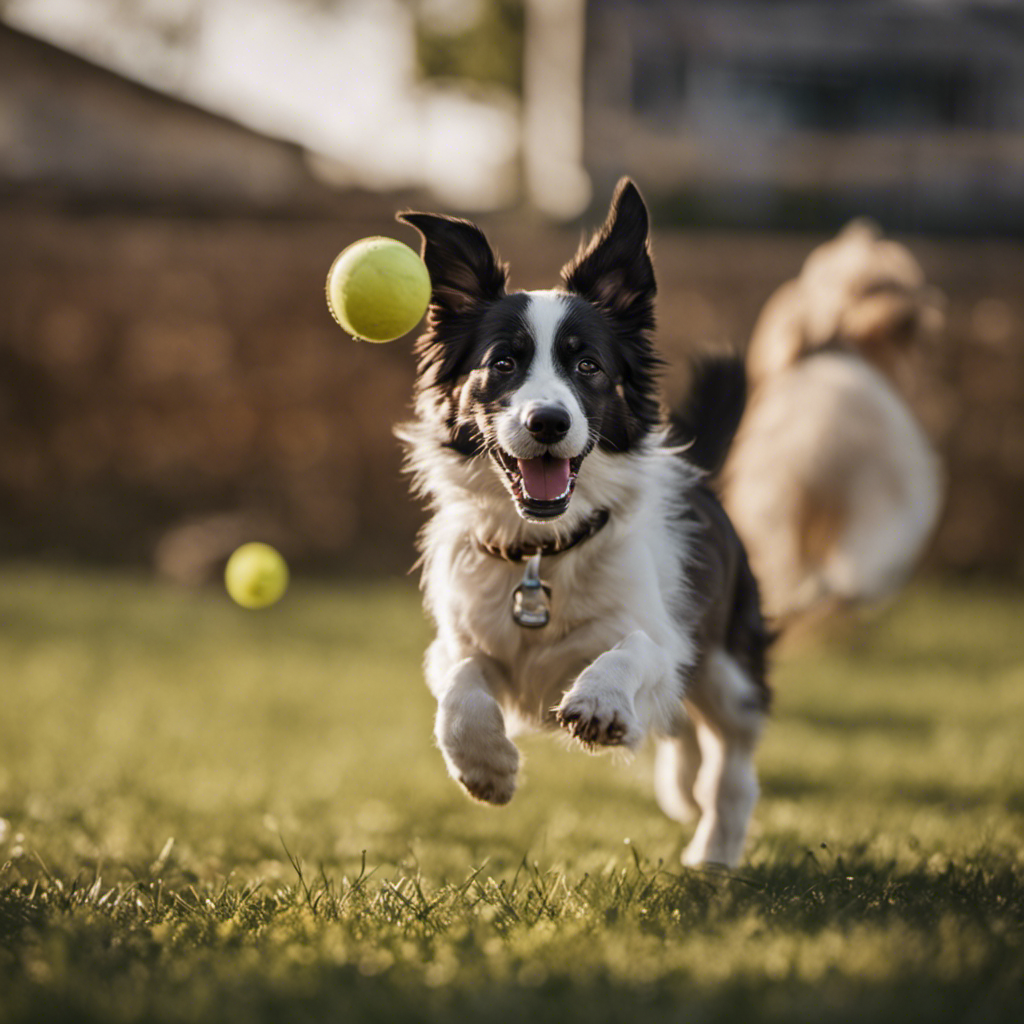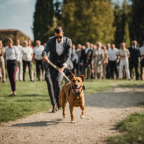- Key Takeaways
- Understanding the Importance of Play in Dog Training
- Teaching Your Dog the Command 'Gioca
- Setting Up a Play Area for Your Pup
- Fun and Interactive Games to Play With Your Dog
- Incorporating 'Gioca' Into Everyday Activities
- Troubleshooting Common Challenges With 'Gioca
- Taking 'Gioca' to the Next Level: Advanced Play Commands
- Benefits of Regular Playtime for Your Dog's Overall Well-being
Click and GO TO THE BEST DOG NAME GENERATOR HERE

Looking to enhance your dog’s training? Discover the power of Italian dog commands with ‘Gioca’ (play).
In this article, we’ll delve into the importance of play in dog training and show you how to teach your furry friend this fun and interactive command.
From creating a play area to incorporating ‘Gioca’ into everyday activities, we’ve got you covered.
Get ready to take your dog’s training to the next level and reap the benefits of regular playtime for their overall well-being.
- Key Takeaways
- Understanding the Importance of Play in Dog Training
- Teaching Your Dog the Command 'Gioca
- Setting Up a Play Area for Your Pup
- Fun and Interactive Games to Play With Your Dog
- Incorporating 'Gioca' Into Everyday Activities
- Troubleshooting Common Challenges With 'Gioca
- Taking 'Gioca' to the Next Level: Advanced Play Commands
- Benefits of Regular Playtime for Your Dog's Overall Well-being
Key Takeaways
- Incorporating play strengthens the bond and reinforces positive behavior.
- Play helps establish trust, communication, and mutual understanding.
- Engaging in playtime creates a positive association with training sessions.
- Playtime serves as a reward, motivating dogs and keeping their interest high.
Understanding the Importance of Play in Dog Training
You should always incorporate play into your dog training sessions to strengthen the bond and reinforce positive behavior. Play serves a crucial role in building a strong connection between you and your dog. It’s more than just a fun activity; it helps establish trust, communication, and mutual understanding. When you engage in playtime with your dog, it allows you to spend quality time together, creating a positive association with training sessions.
Using playtime as a reward in training sessions is an effective way to motivate your dog and keep their interest high. By incorporating play as a reward, you make training sessions enjoyable for your dog, making them eager to participate and learn. It provides an opportunity for them to release energy, reduce stress, and maintain a positive attitude towards training.
Furthermore, playtime can also be used as a way to reinforce specific commands or behaviors. For example, you can incorporate play into teaching your dog the command ‘gioca’ (play). By using play as a reward for following the command, your dog will associate playtime with successfully executing the command, making them more likely to respond to it in the future.
In the next section, we’ll discuss how to effectively teach your dog the command ‘gioca’ and incorporate play into the training process.
Teaching Your Dog the Command ‘Gioca
To teach your dog the command ‘Gioca’, start by using a favorite toy as a reward during training sessions. ‘Gioca’ is the Italian word for ‘play’, and teaching your dog this command can be a fun and useful addition to their obedience training. It’s important to note that the age of your dog can affect the way you approach teaching them this command.
For puppies, you can begin introducing ‘Gioca’ as early as 8 weeks old. Start by using the toy to engage their attention and then say the command clearly and enthusiastically. When they show any sign of interaction with the toy, reward them with praise and a treat.
As your dog grows older, you can incorporate ‘Gioca’ into their obedience training. For example, during a training session, you can ask your dog to sit, stay, or lie down, and then reward them by saying ‘Gioca’ and giving them the toy to play with as a reward. This will reinforce their understanding of the command and make it more enjoyable for them.
Remember to be consistent and patient when teaching your dog any command, including ‘Gioca’. With practice and positive reinforcement, your furry friend will soon master this command and you both can enjoy hours of playtime together.
Setting Up a Play Area for Your Pup
Don’t forget to create a safe and engaging play area for your pup, where they can have fun and explore their surroundings. Designing a dog-friendly play area, especially in small spaces, requires some creativity and planning.
Here are four tips to help you create the perfect play area for your furry friend:
-
Utilize vertical space: In small spaces, it’s important to maximize every inch of available space. Consider using wall-mounted shelves or hanging baskets to provide your pup with elevated areas to explore and play.
-
Choose durable and safe materials: Opt for materials that are sturdy, easy to clean, and safe for your dog. Avoid using toxic plants, sharp edges, or loose objects that can pose a hazard to your pup.
-
Incorporate interactive toys: Keep your pup mentally stimulated by including interactive toys in the play area. Puzzle toys, treat-dispensing toys, and chew toys can provide hours of entertainment.
-
Create designated zones: Divide the play area into different zones to cater to your pup’s needs. Have a space for play, relaxation, and potty breaks. This will help your pup understand boundaries and establish a routine.
Fun and Interactive Games to Play With Your Dog
Try playing a game of fetch with your dog using a tennis ball for some fun and interactive exercise. Dogs thrive on mental stimulation through play, and incorporating brain games into their routine is a great way to keep them entertained and engaged. One simple game you can try is the “find it” game. Create a table with two columns and five rows in markdown format to make the writing more interesting and engaging:
| Game Name | How to Play |
|---|---|
| Find it | Hide treats around the house or in the yard and encourage your dog to sniff them out. |
| Puzzle toys | Fill puzzle toys with treats or kibble, challenging your dog to figure out how to get to the reward. |
| Scent work | Teach your dog to search for specific scents, like essential oils, by hiding them in different areas. |
| Tug of war | Engage your dog in a game of tug of war using a rope toy, providing both physical and mental exercise. |
| Hide and seek | Have someone hold your dog while you hide, then call their name and encourage them to find you. |
In addition to mental stimulation, dogs also need outdoor playtime to explore nature with their furry friends. Take your dog for a walk in the park or spend time in your backyard playing games like fetch or frisbee. Not only will this provide physical exercise, but it will also allow your dog to engage their senses and enjoy the outdoors. Incorporating “gioca” (play) into everyday activities is essential for a happy and healthy dog.
Incorporating ‘Gioca’ Into Everyday Activities
You can easily incorporate ‘gioca’ into your everyday activities by playing games like fetch or tug of war with your dog. Not only will this provide mental and physical stimulation for your furry friend, but it will also help strengthen the bond between you and your dog.
Here are four ways you can incorporate ‘gioca’ into your daily routine:
-
Play Hide and Seek: Hide your dog’s favorite toy or treat and encourage them to find it. This game not only engages their sense of smell but also encourages problem-solving skills.
-
Interactive Puzzle Toys: Invest in puzzle toys that require your dog to figure out how to get to the treats inside. This will keep them entertained and mentally stimulated.
-
Training Sessions: Incorporate ‘gioca’ into your training sessions by rewarding your dog with playtime after they successfully complete a command. This positive reinforcement will motivate them to learn and perform better.
-
Playdates with Other Dogs: Organize playdates with other friendly dogs to allow your dog to socialize and engage in play. This not only provides exercise but also helps them learn important social skills.
Troubleshooting Common Challenges With ‘Gioca
Having trouble getting your dog to respond to the command ‘Gioca’ (play)?
One common challenge is communication issues during play. Make sure you’re using clear and consistent signals, such as hand gestures or verbal cues.
If your dog still doesn’t respond, it could be due to a lack of motivation or interest.
Communication Issues During Play
The article discusses how to overcome communication issues during play when using the Italian dog command ‘Gioca. When playing with your dog, it’s crucial to have clear and consistent commands to ensure effective communication. Here are four tips to help you overcome communication issues during play:
-
Use positive reinforcement: Reward your dog with treats or praise when they respond correctly to the ‘Gioca’ command. This will encourage them to understand and follow the command more consistently.
-
Be consistent with your body language: Dogs rely on visual cues, so make sure your body language matches the command. Use clear hand gestures or body movements to accompany the ‘Gioca’ command.
-
Practice in different environments: Dogs can struggle to generalize commands, so it’s important to practice the ‘Gioca’ command in various locations to reinforce their understanding.
-
Seek professional help if necessary: If you’re still experiencing communication issues, consider consulting a professional dog trainer who can provide guidance and support.
Lack of Response
If your dog isn’t responding to the command ‘Gioca’, try using a different tone of voice to capture their attention. Dogs, like humans, can have different levels of motivation when it comes to play. Sometimes, their lack of response may be due to a lack of motivation or distractions during play.
It’s important to understand that dogs have different personalities and preferences, so finding the right approach is key. Experiment with different tones of voice, using a more enthusiastic or commanding tone to pique their interest.
Additionally, minimize distractions during play by choosing a quiet and familiar environment. By addressing these factors, you can increase your dog’s responsiveness to the command ‘Gioca’ and enhance your playtime together.
Now, let’s take ‘Gioca’ to the next level with advanced play commands.
Taking ‘Gioca’ to the Next Level: Advanced Play Commands
You should try using three new advanced play commands to take ‘Gioca’ to the next level. These commands will enhance your interactive playtime with your dog and provide mental and physical stimulation. Here are four techniques you can try:
-
Fetch and Retrieve: Teach your dog to fetch a specific toy and bring it back to you. Start by introducing the toy and enticing them to chase after it. Gradually, add the command ‘fetch’ and reward them when they bring it back. This game not only exercises their body but also strengthens their obedience skills.
-
Hide and Seek: Hide a toy in a different room and encourage your dog to find it. Begin by hiding the toy in an obvious place and gradually make it more challenging. Use the command ‘find it’ to guide them. This game stimulates their scent tracking abilities and engages their problem-solving skills.
-
Tug of War: Engage in a friendly game of tug with your dog using a sturdy rope toy. Teach them the commands ‘take it’ and ‘let go’ to ensure safe and controlled play. Tug of war helps build their strength, promotes bonding, and teaches them impulse control.
-
Puzzle Toys: Introduce interactive puzzle toys that dispense treats when your dog solves them. These toys challenge their cognitive abilities and keep them entertained for hours. Make sure the toys are appropriate for their size and difficulty level.
Benefits of Regular Playtime for Your Dog’s Overall Well-being
Playing with your dog regularly can significantly improve their overall well-being and provide them with much-needed mental and physical stimulation. This is especially important for senior dogs, as they may experience age-related health issues and a decrease in mobility. Regular playtime can help keep their minds sharp and bodies active, preventing boredom and promoting a healthier lifestyle.
When it comes to incorporating playtime into a busy schedule, it’s all about finding small pockets of time throughout the day. Even just 10-15 minutes of play can make a big difference for your senior dog. You can use interactive toys, such as puzzle feeders or treat-dispensing balls, to engage their minds and provide mental stimulation. If you have a backyard, setting up a safe play area where they can roam freely can also be beneficial.
During playtime, focus on activities that cater to your dog’s age and abilities. For senior dogs, low-impact exercises like gentle walks, swimming, or playing fetch with soft toys are great options. Remember to always consider their comfort and never push them beyond their limits.
- Key Takeaways
- Understanding the Importance of Play in Dog Training
- Teaching Your Dog the Command 'Gioca
- Setting Up a Play Area for Your Pup
- Fun and Interactive Games to Play With Your Dog
- Incorporating 'Gioca' Into Everyday Activities
- Troubleshooting Common Challenges With 'Gioca
- Taking 'Gioca' to the Next Level: Advanced Play Commands
- Benefits of Regular Playtime for Your Dog's Overall Well-being


